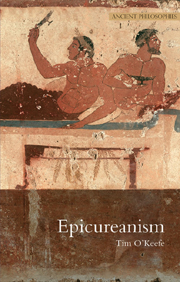Book contents
- Frontmatter
- Contents
- Preface
- Acknowledgements
- Sources and abbreviations
- Chronology
- 1 Introduction: the life of Epicurus and the history of Epicureanism
- I Metaphysics and physics: introduction and overview
- 2 Atoms and void
- 3 Atomic motion
- 4 Sensible qualities
- 5 Cosmology
- 6 Biology and language
- 7 The mind
- 8 Freedom and determinism
- II Epistemology: introduction and overview
- III Ethics: introduction and overview
- Glossary of terms
- Notes
- Further reading
- Bibliography
- Index
8 - Freedom and determinism
from I - Metaphysics and physics: introduction and overview
- Frontmatter
- Contents
- Preface
- Acknowledgements
- Sources and abbreviations
- Chronology
- 1 Introduction: the life of Epicurus and the history of Epicureanism
- I Metaphysics and physics: introduction and overview
- 2 Atoms and void
- 3 Atomic motion
- 4 Sensible qualities
- 5 Cosmology
- 6 Biology and language
- 7 The mind
- 8 Freedom and determinism
- II Epistemology: introduction and overview
- III Ethics: introduction and overview
- Glossary of terms
- Notes
- Further reading
- Bibliography
- Index
Summary
The Epicureans wish to preserve human freedom in a world whose ultimate constituents are just extended bits of stuff flying around in empty space. And in order to do so, they famously posit an indeterministic atomic motion: the swerve. While their use of the swerve to preserve our freedom is intriguing, it was subject to withering criticisms by their Academic and Stoic opponents.
Lucretius and “free will”
How our freedom is threatened by determinism, and how the swerve is supposed to counter this threat, are unfortunately obscure; nothing even close to a consensus view of what the Epicurean position is supposed to be has emerged. In part that is because the swerve is not even mentioned in the extant writings of Epicurus, so we have to rely on later reports in order to try to piece together Epicurus' position. Lucretius presents the most extended consideration we have by an Epicurean of the swerve and freedom (DRN II 251–93). It comes immediately after his argument that the swerve must exist in order for atoms to collide. Atoms naturally fall straight downwards, and they also move because of collisions and entanglements with other atoms. However, there is a third cause of atomic motion, a random swerve to the side by one spatial minimum, which saves us from what Lucretius calls the “decrees of fate”.
- Type
- Chapter
- Information
- Epicureanism , pp. 73 - 84Publisher: Acumen PublishingPrint publication year: 2009

